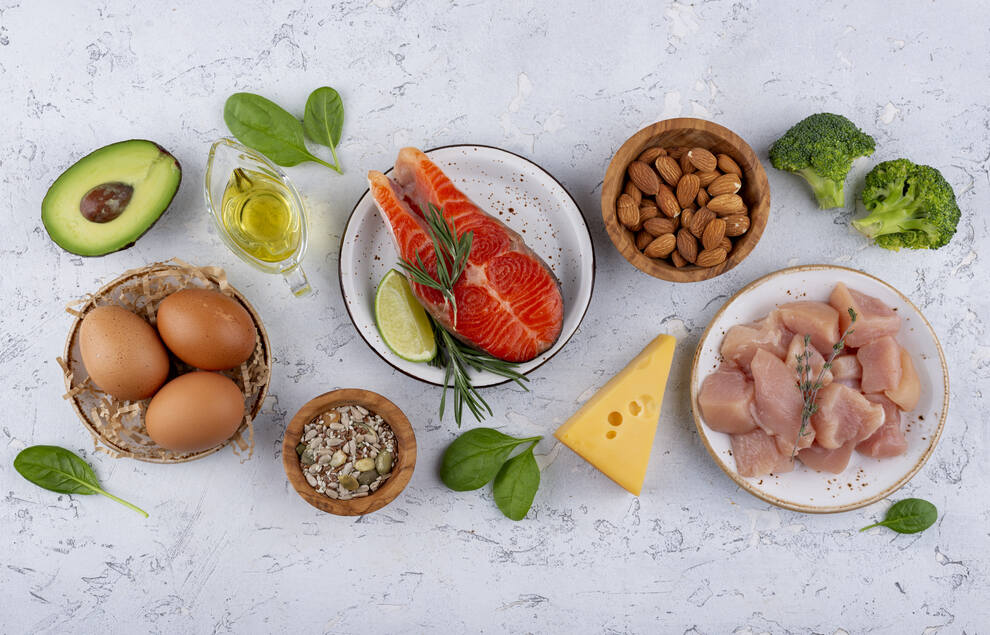Protein – a word we frequently encounter, especially in the gym. Trainers often emphasize on the importance of consuming more protein to build muscles and recover from intense workouts.
But what exactly is protein, how does it aid in muscle development, and what other roles does it play in our bodies?
What is protein?
Protein is a very large molecule made up of basic units called amino acids. It contains carbon, hydrogen, oxygen, nitrogen, and sulphur.
Protein is the vital macronutrient our body needs regularly to function healthily. Whether your goal is weight loss, muscle gain, post-workout recovery, or overall well-being, sufficient protein intake is crucial.
How does protein help our body?
Protein is a fundamental component of every cell in our bodies. It plays a pivotal role in building and repairing tissues, including skeletal muscles, bones, hair, skin, cartilage, and blood. Additionally, protein aids in the production of enzymes and hormones that regulate metabolism and growth.
What are the food sources of protein?
Protein is an important nutrient that our body needs in larger quantities. There are several food options to complete our daily protein needs. Here is a list of protein-rich foods:
- Animal Sources: Skinless chicken, roasted turkey, lamb, pork, salmon, tuna etc.
- Plant sources: Lentils, black beans, chickpeas, quinoa, green peas etc.
- Egg and dairy sources: Greek yogurt, cottage cheese, skim milk, regular yogurt etc.
- Nuts and seeds sources: Peanuts, peanut butter, almonds, flaxseeds, chia seeds, walnuts etc.
How much protein do you need?
Calculating your daily protein needs is as simple as knowing your body weight. The amount varies from person to person. The Recommended Dietary Allowance (RDA) for a sedentary person, not engaging in any physical activity needs 0.8 gm of protein per kg of body weight. This translates into 56 grams per day for a 70 kg person.
(Note: The RDA for children is higher, at 1.5 grams of protein per kilogram of body weight.)
How much protein does an athlete need?
Athletes or physically active individuals require more protein than average. To support muscle healing and repair, an active person needs 1 gram of protein per pound of body weight.
The American College of Sports Medicine recommends that an athlete can benefit from as much as 2.3 grams of protein per kilogram of body weight or around 1 gram per pound of body weight.
Do you need protein supplements?
A well-balanced diet can typically meet daily protein requirements for most people. However, some find it inconvenient, expensive, or uncomfortable to consume adequate protein solely through food sources. For such individuals, protein supplements offer a convenient way to meet their daily protein needs.
Do You Need More Or Less Protein As You Age?
"Even if you don't measure it out to the gram, the lesson here is that as you age, you need more protein," Layne Norton, PhD, says.
As we age, our bodies become less efficient in absorbing dietary protein. This deficiency can lead to reduced strength and lean mass. Regular exercise and sufficient protein intake can help maintain fitness throughout one's golden years.
A common problem with elderly people is the loss of muscle tissue. Protein helps to reverse this natural process.
A study published in the Journal of the American Medical Directors Association recommends that people over 65 years of age consume a minimum of 1-1.2 grams per kilogram of body weight per day to maintain and regain lean body mass.
Conclusion
Protein is an essential macronutrient that supports various bodily functions, including tissue repair and hormone regulation. By incorporating protein-rich foods into our diets, we can achieve our health and fitness goals. For athletes and older individuals, meeting increased protein requirements is vital for optimal performance and maintaining muscle mass.

